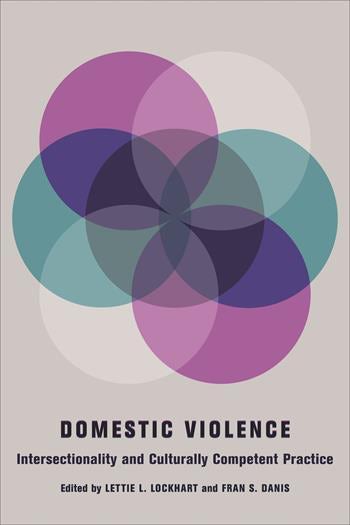In Domestic Violence: Intersectionality and Culturally Competent Practice, experts working with twelve unique groups of domestic abuse survivors provide the latest research on their populations and use a case study approach to demonstrate culturally sensitive intervention strategies. Chapters focus on African Americans, Native Americans, Latinas, Asian and Pacific Island communities, persons with disabilities, immigrants and refugees, women in later life, LGBT survivors, and military families. They address domestic violence in rural environments and among teens, as well as the role of religion in shaping attitudes and behavior.
Lettie L. Lockhart and Fran S. Danis are editors of the Council of Social Work Education's popular teaching modules on domestic violence and founding co-chairs of the CSWE symposium on violence against women and children. In their introduction, they provide a thorough overview of intersectionality, culturally competent practice, and domestic violence and basic practice strategies, such as universal screening, risk assessment, and safety planning. They follow with collaborative chapters on specific populations demonstrating the value of generalist social work practice, including developing respectful relationships that define issues from the survivor's perspective; collecting and assessing data; setting goals and contracting; identifying culturally specific interventions; implementing culturally appropriate courses of action; participating in community-level strategies; and advocating for improved policies and funding at local, state, and federal levels. Featuring resources applicable to both practitioners and clients, Domestic Violence forms an effective tool for analysis and action.
- Table of Contents
- Acknowledgments
- Contributors
- Introduction, by
Fran S. Danis and Lettie L. Lockhart
- 1. Cultural Competence and Intersectionality: Emerging Frameworks and Practical Approaches, by Lettie L. Lockhart and Jacquelyn Mitchell
- 2. Understanding Domestic Violence: A Primer, by
Fran S. Danis and Shreya Bhandari
- 3. Our Survival, Our Strengths: Understanding the Experiences of African American Women in Abusive Relationships, by Tricia B. Bent-Goodley, Lorraine Chase, Elizabeth A. Circo, and Selena T. Antá Rodgers
- 4. A Lily Out of the Mud: Domestic Violence in Asian and Pacific Islander Communities, by
Mimi Kim, Beckie Masaki, and Gita Mehrotra
- 5. Social Work Practice with Abused Persons with Disabilities, by
Elizabeth P. Cramer and Sara-Beth Plummer
- 6. Domestic Violence Advocacy with Immigrants and Refugees, by
Rupaleem Bhuyan, Woochan Shim, and Kavya Velagapudi
- 7. Domestic Abuse in Later Life, by
Ann Turner, Deb Spangler, and Bonnie Brandl
- 8. Culturally Competent Practice with Latinas, by Blanca M.
Ramos, Bonnie E. Carlson, and Shanti Kulkarni
- 9. Outing the Abuse: Considerations for Effective Practice with Lesbian, Gay, Bisexual, and Transgender Survivors of Intimate Partner Violence, by
Taryn Lindhorst, Gita Mehrotra, and Shawn L. Mincer
- 10. In Service to Our Country: Military Responses to Domestic Violence, by
Delores F. Johnson and Deborah D. Tucker
- 11. Weaving the Past into the Present: Understanding the Context of Domestic Violence Against Native American Women, by Brenda Bussey and J. B. Whippl
e
- 12. A Commentary on Religion and Domestic Violence, by Marie M. Fortune, Salma Elkadi Abugideiri,
and Mark Dratch
- 13. Appalachia: Addressing Domestic Violence in the Rural Environment, by
Elizabeth J. Randall and Leslie E. Tower
- 14. Where Teens Live: Taking an Ecological Approach to Dating Violence Prevention, by
Barbara Ball and Barri Rosenbluth
- Notes
- Index
- Series List

